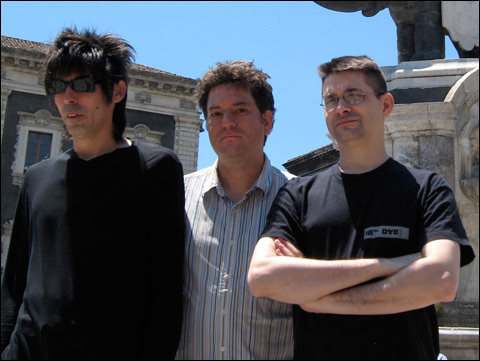
NO APOLOGIES “We tour so little that it’s a total fucking blast for us, and we make those shows count,” says Albini (right, with Todd Trainer and Bob Weston). |
"It seems, in a sense, like we can get away with murder." I'm talking on the phone with Steve Albini as he relaxes during a rare respite from his engineering duties at the studio he owns and operates, Chicago's Electrical Audio, and he's describing how things operate with Shellac, the band for whom he's played guitar and sung since the early '90s. His statement is made in the context of how much leeway the band's audiences have given them. But the murder that Shellac have gotten away with isn't confined to the stage — for almost two decades, Albini and company have been showing the world that it is possible to do, as a band, whatever you want to do, entirely on your own terms, and still come out on top.Of course, it helps that they formed on a wave of underground hype. When Big Black, the controversial punk/industrial hybrid Albini had formed with two friends and a drum machine when he was in college, broke up in 1987, they were at the peak of their popularity. Their farewell disc, Songs About Fucking, remains a pinnacle of post-punk ferocity. Albini's explanation at the time was that they broke up "to prevent us from overstaying our welcome." But the truth is that the legend of Big Black ballooned only in their absence — and that legend wasn't just about the music's relentless pummeling but also about the irascible and scabrous mind of Albini, as a musician, a pundit, and a recording engineer.By the early '90s, Albini had become an in-demand studio engineer (a term he preferred to "producer"), recording high-profile albums for the Pixies, Slint, and the Jesus Lizard while also engineering countless sessions for more-obscure acts. He put Shellac together as an act that would be able to work on the sidelines of his burgeoning day job. That suited the other members just fine: bassist and Waltham native Bob Weston was and is himself a successful engineer, and drummer Todd Trainer managed a warehousing and shipping company in Minneapolis. The band's plan was simple: play only the shows they wanted to play, put out records only when they felt like it, and divorce themselves from the co-opting of underground culture by major labels and mainstream media.
"The thinking, at the time," says Albini, "was that bands should want to play for as many people and as big an audience as possible, and that kind of thinking was used to justify all kinds of boorish behavior and pandering. And our thinking was that music culture isn't necessarily better when you lay it on with a ladle and spatter every potential person with your band. I know from my own existence as a fan that the bands I have loved the most and the longest have been bands I found on my own, not bands that were sprayed at me. So I don't think there's necessarily anything wrong with doing your thing and letting your natural audience find you."